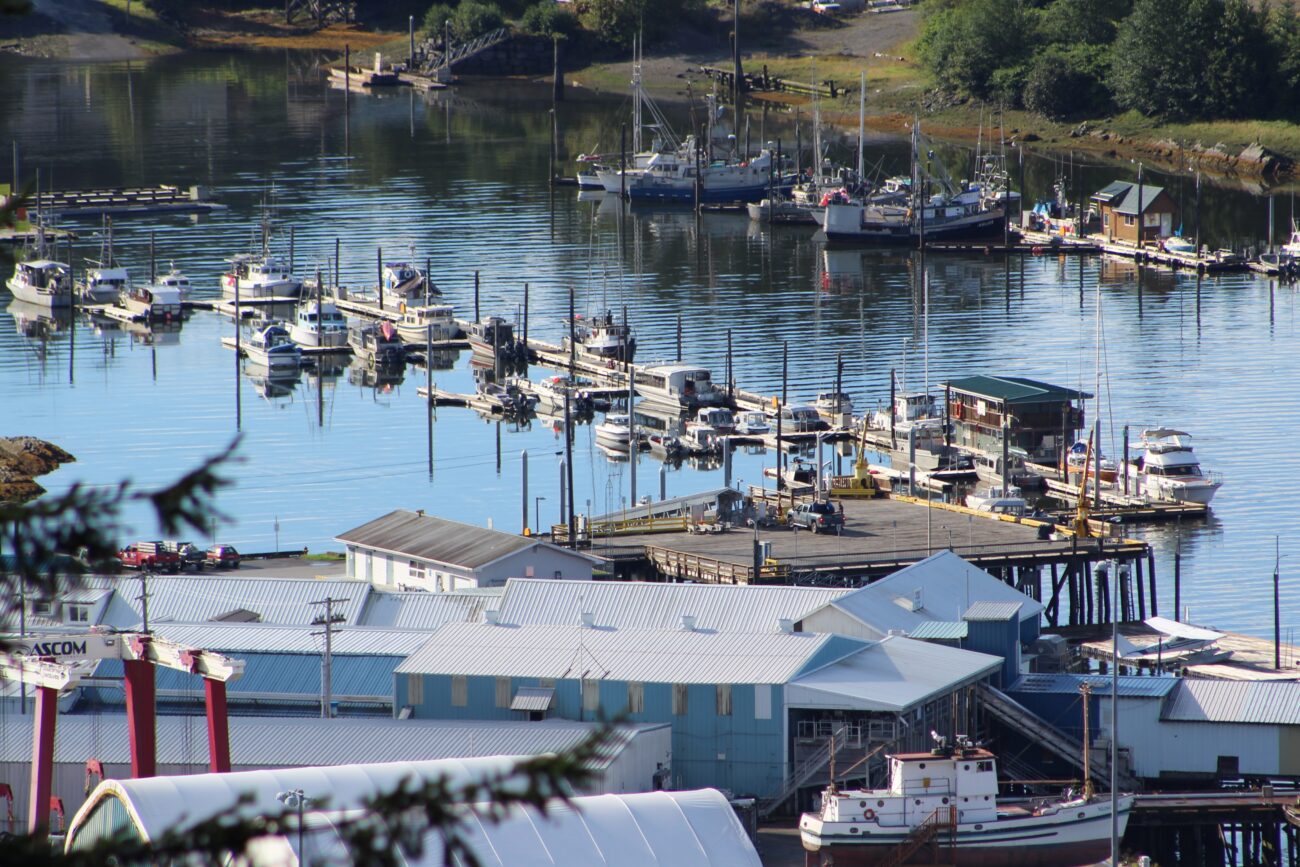
(Sage Smiley / KSTK)
One of Wrangell’s two fish processors will remain closed for the second year in a row. Seattle-based Trident Seafoods cites a dismal salmon forecast for its decision.
Chum and pink salmon returns to Southeast Alaska over the last few years have crumpled, and the predictions for the coming season aren’t especially heartening.
“It’s been a real disaster around here,” says Wrangell commercial fisherman Gig Decker. “I mean, my main income has been the dogs — the chum salmon — and the runs just haven’t been coming back. They don’t know if it’s because of the blob or warming or what it is, but the biologists don’t seem to have a lot of optimism about it.”
Citing the poor returns, one of Wrangell’s two fish processing plants stayed shuttered and silent last summer. And the royal blue Trident plant in Reliance Harbor is going to stay closed for a second year.
Trident Seafoods has confirmed that its Wrangell plant won’t be opening again this year. Trident spokesperson Stefanie Moreland wrote in a statement that: “We hope to see a return to higher abundance and opportunity to support running the facility in the future.”
Trident has had a presence in Wrangell since 2009 when it bought out the bankrupt Wrangell Seafoods company. The seafood giant operates about a dozen other plants throughout Alaska, including in Petersburg and Ketchikan.
Southeast chum salmon returns for 2021 are projected to be some of the lowest in the last 25 years. Pink salmon look a bit rosier — they’re projected to swim back to Southeast this year in average numbers.
Decker, the Wrangell fisherman, says he understands that Trident can’t justify the cost of operating a plant if the fish aren’t there, but it complicates the fishing season to have the Wrangell plant closed: “Of course, it was really convenient for me — not just that they bought my fish, but there was a lot of other services, like machining and moving gear and equipment. And so it — it’s been a real drag to not have a cannery open.”
Wrangell’s other, smaller processing plant, Sea Level Seafoods, will operate this year although it’s getting started later than usual.
Its Oregon-based parent company Pacific Seafood said in a statement that the Wrangell plant didn’t operate during March’s halibut opening because of complications of staffing the facility due to COVID-19. It pushed its opening date back until May 1.
That’s left Wrangell fishermen like Alan Reeves feeling desperate after last year’s low halibut prices. The wholesale market was poor in 2020, with hotels and restaurants buying a lot less everything — including seafood.
“I lost $40,000 on it last year, at least,” says Reeves. It’s not something you play with, when you’ve got that kind of investment. I mean, I’ve got family that go out with me and everything else, and they rely on it [as well].”
Reeves spent about a decade on Wrangell’s port commission and he knows the importance of fisheries business taxes to the island’s local government. But he also says he couldn’t afford to wait for a Wrangell processor to come online. He had to go somewhere else to sell halibut.
“The jobs and the tax went to another town this year,” he explained. “For the first time since 1981 commercial fishing. I’ve only sold one time out of town.”
Last year’s fish tax payments haven’t been calculated yet, so it’s not clear what the financial impact of 2020’s poor returns and single operating plant will be.
But the $80,000 drop between 2018 and 2019’s payments doesn’t bode well for the revenue Wrangell’s borough government expects to receive for last year’s lower fish returns.
Wrangell officials say it’s difficult to determine the exact effects of a shuttered plant. There won’t be the large-scale utilities payments from the plant. Fish taxes paid out to the borough will probably be lower. And there’s also the simple lack of processing workers eating, living, and working in the community.
Last year, Trident’s empty bunkhouses were rented out as isolation sites by the city government at the onset of the pandemic, but were never used. The Alaska Crossings wilderness behavioral therapy program also housed out-of-town guides in Trident’s bunkhouses immediately after they arrived earlier this spring.
Decker says he’s holding out hope that there might be a fishy hail mary this season, even though Wrangell’s Trident plant won’t be open.
“I’ve seen things like this before,” Decker says. “I’ve had years where I did tremendously well, after everyone thought it was going to be a disaster. So that’s fishing.”
Sea Level Seafoods says they’re working on icing and baiting boats. They’re typically up and running through the end of October.
Get in touch with KSTK at news@kstk.org or (907) 874-2345.












